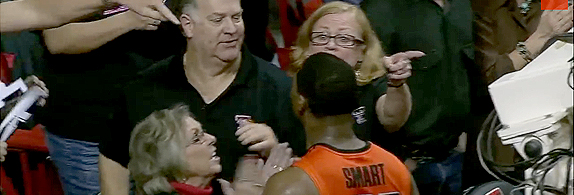
Dear Lobo Fans,
As Marcus Smart returns to the court this Saturday, I wonder what he’s been taught and what we have learned. After Smart’s push of a fan in Lubbock last week, Oklahoma State University and the Big 12 attempted to send a message that violence among players and spectators has no place in college basketball. While it is debatable whether or not a three-game suspension conveys this message, the situation leaves Smart and the rest of us with a clear lesson: universities and intercollegiate athletic institutions are not ready for black athletes to bear their voices.
During last Sunday’s press conference, Smart exhibited remorse during his apology. For me, he felt the weight of the situation. Smart understood he committed an act of violence and created a volatile situation which could have easily escalated. While Smart directed his apology to groups--the institutions involved, students, basketball fans, and young people who look up to him--he never explained his side of the story. A week later and into the foreseeable future, Smart remains voiceless.
Smart’s apology was planned, but not completely by him. While Smart spoke articulately and authentically without a script, OSU officials, and maybe indirectly Big 12 officials, told Smart to omit his explanation of what happened. Without the why behind his actions, the public apology remains perfunctory, and the lesson taught focuses on the act of violence which steers everyone away from the root of the problem: racism.
After watching the video, it is clear Smart is provoked by something said in the crowd, but what was said remains a mystery. Many suspect a racial slur provoked Smart, but Jeff Orr, the Texas Tech fan who was pushed, denied using such a slur. In his public apology, Orr said he called Smart “a piece of crap.” While it doesn’t take much imagination to consider how calling a black person “a piece of crap” is a racial slur, Orr explained his side of the story. He has a voice in the situation.
Smart’s explanation may corroborate Orr’s statement. Smart may say he thought he heard something different--maybe a racial slur. He may offer a totally different explanation, but, in many ways, the explanation does not matter as much as Smart giving one.
If Smart offered his explanation, I imagine growing up outside of Dallas and playing in the Big 12 would mean Smart’s life and basketball career contain multiple instances of being targeted because of his race. During this period, Smart has been told many times to ignore what he hears, to walk away from the situation, and to hold himself with grace regardless of how awful the comment--and I am sure Smart has followed these directions many times. On that Saturday in Lubbock, for whatever reason, Smart reacted differently.
OSU and the Big 12 do not want this explanation, or anything like it, because it is bad for business. If Smart explains where he feels racial targeting living on campus or competing as a player, recruits and prospective students will think more-than-twice before committing to that school or that athletic program. A public revelation of racism could cost universities and conferences millions of dollars as fans, advertisers, and TV networks remove financial support.
Silencing Marcus Smart matters to Lobo Nation because, if we had his explanation, fans would have to reflect on how we cheer. We need to consider what we say and what it means. In The Pit, plenty of racist comments have flown over the years. For example, multiple times, I’ve heard fans call a Lobo or an opposing player, a “boy.” While the fan would not admit, or maybe even realize, the underlining racial prejudice, the word is charged with connotations from the antebellum United States continuing into today. As The Pit is no place for violence, it should not be a place for racism.
The teaching of Smart also matters because I fear the UNM Athletics Department would respond to a similar situation as OSU did: muting an athlete to prevent a serious discussion for a false peace. Lobo athletes face racially-derogatory comments during competition. The worst stories I hear from Lobos come from Provo, Utah where UNM regularly faced former-conference-rival BYU. Student athletes need to know that it is unacceptable to respond violently to a derogatory comment, but we cannot expect young people, or anyone for that matter, to carry such weight without proper discourse. Schools, in conjunction with conferences and the NCAA, must support athletes to stand up and express themselves properly when facing hate. This means promoting athletes’ voices, and institutions must validate their experiences by listening and acting.
We must realize that athletes are agents for social change. In an interview with Charles Barkley, President Obama acknowledged that he would not be in his position if it weren’t for progress made by Jackie Robinson. As a country and here in New Mexico, we are not done with this work. We must realize that college athletes are young people. No matter their race, background, or gender, the athletes need agency. They need adults who take their claims seriously. They need institutions which seek to adjudicate the root of the problem, not the reaction. And, they need fans who cheer for them even as the focus shifts from victories on the court to victories that champion much more than a game.
Go Lobos!
Yours from Section K
P.S. As people of color are told to ignore racial slurs, women are told to walk away from sexist comments. These teachings put the responsibility in abusive situations on the target. Minorities carry an idea of fault when they are targeted by hate. Women hear “she got herself into that situation” or “she was asking for it.” As a society, we need to consider why aggressors enjoy negative culpability in these situations, and we need to start thinking about what we teach.



Responses to “Section K: Teaching Marcus Smart and What We Learn”